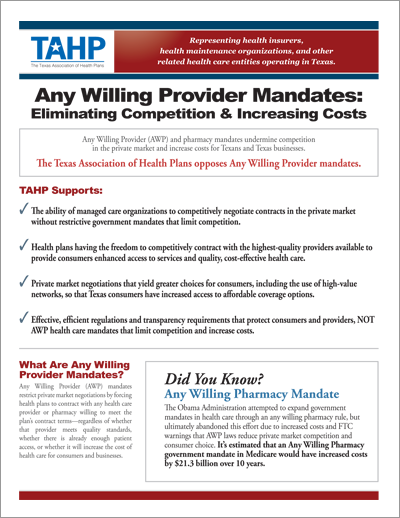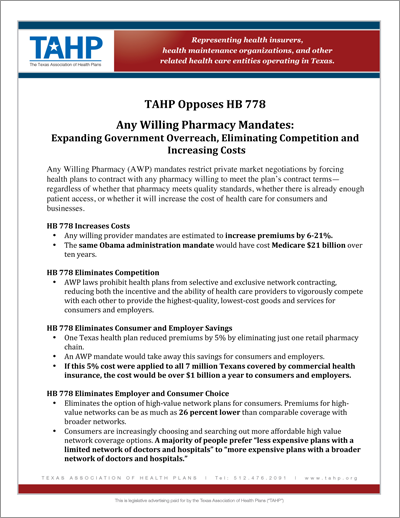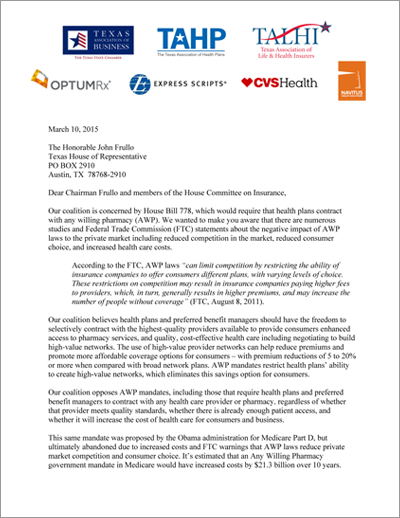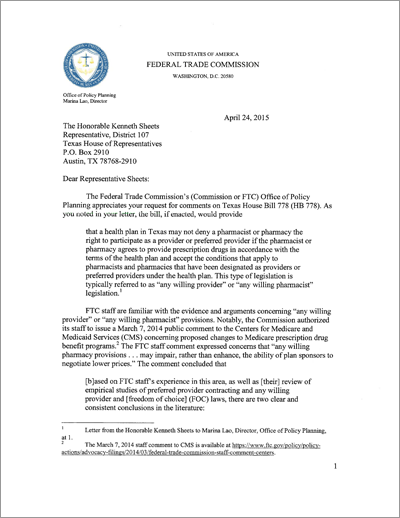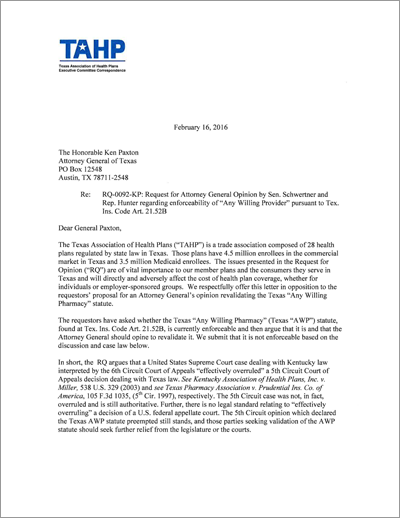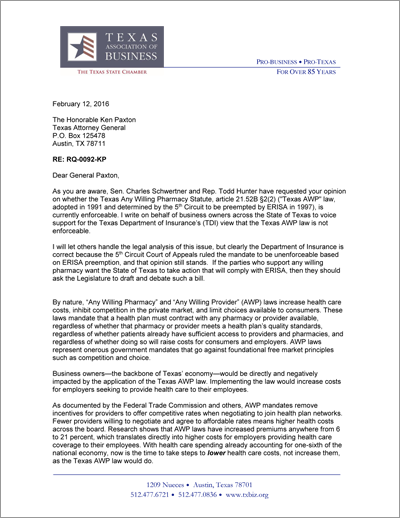Any Willing Provider Mandates
Eliminating Private Market Competition

Any Willing Provider (AWP) and pharmacy mandates undermine competition in the private market and increase costs for Texans and Texas businesses.
Any Willing Provider (AWP) mandates restrict private market negotiations by forcing health plans to contract with any health care provider or pharmacy willing to meet the plan’s contract terms—regardless of whether that provider meets quality standards, whether there is already enough patient access, or whether it will increase the cost of health care for consumers and businesses. AWP mandates create a presumed “right to employment contract”, a right that does not exist in any other sector of the health care industry or in any other industry. Just as schools are not mandated to hire “any willing teacher,” health plans should not be mandated to hire “any willing provider,” particularly if the provider does not meet the health plan’s quality standards or adding the provider increases the cost of coverage.
Any willing provider mandates eliminate private market competition and increase health care costs for employers, consumers, and taxpayers.
Any Willing Provider Mandates Resources:
Any Willing Provider Mandates: Eliminating Competition & Increasing Costs
A fact sheet on AWP mandates and how they undermine competition in the private market and increase costs for Texans and Texas business.
March 2015
In opposition of Any Willing Provider Mandates, TAHP supports the ability of managed care organizations to competitively negotiate contracts in the private market without restrictive government mandates that limit competition. TAHP is also in favor of private market negotiations that yield greater choices for consumers, including the use of high-value networks, so that Texas consumers have increased access to affordable coverage options.
TAHP Opposition to HB 778: Any Willing Pharmacist Mandate
TAHP opposition to HB 778, which would have created an “any willing pharmacist” mandate.
March 2015
TAHP opposes Any Willing Pharmacy (AWP) mandates, which restrict private market negotiations by forcing health plans to contract with any pharmacy willing to meet the plan’s contract terms—regardless of whether that pharmacy meets quality standards, whether there is already enough patient access, or whether it will increase the cost of health care for consumers and businesses.
Coalition Letter to House Insurance in Opposition to Any Willing Pharmacist Mandates
A coalition letter to the Texas House Committee on Insurances expressing concerns about AWP mandates and how they undermine competition in the private market and increase costs for Texans and Texas business.
March 2015
The coalition, which included TAHP, expressed their strong opposition to AWP mandates, including those that require health plans and preferred benefit managers to contract with any health care provider or pharmacy, regardless of whether that provider meets quality standards, whether there is already enough patient access, and whether it will increase the cost of health care for consumers and business.
Federal Trade Commission Letter to Texas
A letter submitted to Texas on FTC concerns that AWP mandates undermine private market competition.
April 2015
This letter to the House of Representatives, District 107 expresses that FTC staff are familiar with the evidence and arguments that “any willing provider” or “any willing pharmacist” provisions may impair, rather than enhance, the ability of plan sponsors to negotiate lower rates.
TAHP Letter to Attorney General Paxton on Any Willing Pharmacist Mandates
A letter to the OAG expressing concerns with “any willing pharmacist” mandates and how they undermine competition in the private market and increase costs for Texans and Texas business.
February 2016
This letter is in response to a Request for Opinion for revalidating the “Any Willing Pharmacy” statute. TAHP respectfully stated that the issues presented are of vital importance to our member plans and the consumers they serve in Texas and will directly and adversely affect the cost of health plan coverage, whether for individuals or employer-sponsored groups.
TAB Letter to Attorney General Paxton on Any Willing Pharmacist Mandates
A letter to the OAG expressing concerns with “any willing pharmacist” mandates and how they undermine competition in the private market and increase costs for Texans and Texas business.
February 2016
This letter is to voice support for the Texas Department of Insurance’s (TDI) view that Texas “Any Willing Provider” and “Any Willing Pharmacist” (AWP) laws are not enforceable, and it states these laws increase health care costs, inhibit competition in the private market, and limit choices available to consumers. AWP laws represent onerous government mandates that go against foundational free market principles such as competition and choice.


